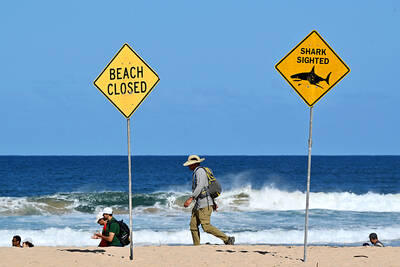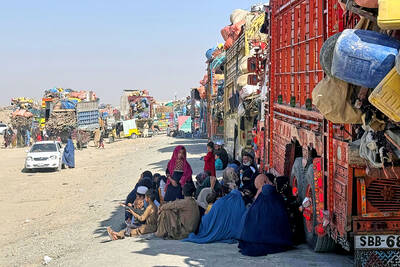On one side of the wire coils, anti-government protesters fed bread crumbs to the pigeons. On the other, a dozen Lebanese soldiers dozed in the shade. Up the road, a convoy carrying Arab League mediators weaved past barricades outside the prime minister’s office. The bodyguards’ heads swiveled in the car windows, scanning for trouble.
The recent parallel scenes — the languid and the menacing — show why Lebanon is a puzzle to the outside world.
The country defies easy definition: a parliamentary democracy with a power-sharing quota for top posts, a place where luxury developments sit near bullet-pocked ruins, a commercial hub whose land and sea exits are vulnerable to the whims of powerful neighbors like Israel and Syria.
Alliances shift, enemies become friends.
Lebanon is three-quarters of the size of Connecticut and with a population of 4 million, smaller than Singapore.
It is different from the rest of the Arab world in key ways. But its overlapping tensions — religious, sectarian, regional and international — act as a kind of compressed textbook on the problems that simmer across the Middle East.
Lebanon’s adversaries negotiated in Qatar on Sunday after ending the worst violence since the 1975-1990 civil war but normality today in Lebanon is elusive.
Hezbollah has a nearly parallel state, with its own social services, police and combatants who took on Israel in a 2006 war.
The group prevailed militarily in clashes with pro-government factions last week that killed 67 people and forced the Cabinet to rescind decisions to sack the airport security chief and declare the militants’ private telephone network illegal.
The country’s army did not intervene in the fighting, for fear of more sectarian bloodshed.
Lebanon’s lopsided reality also includes UN resolutions that call for the dismantling of all militias. But the masked gunmen roaming the country last week testify to the virtual irrelevance of those resolutions.
Bomb attacks on prominent Lebanese are also a grim routine. The first victim in October 2004 was Marwan Hamadeh, the economy minister who resigned to protest a term extension of the Syrian-backed president. He survived with serious injuries and, as telecommunications minister in the current Cabinet, tried in vain to dismantle Hezbollah’s communications network.
After its civil war ended in 1990, Lebanon enjoyed a long period of relative peace and even prosperity and its people clearly crave conventional normality.
As the recent tensions subsided, the military established a heavy presence in Beirut. But civilians did too: children played in alleyways, and cafes on the famed Hamra shopping street again drew crowds.
All that means Beirut sometimes resembles a city of alternate visions. In some spots, banners bear the image of Shiite heroes such as the religious leader Moussa al-Sadr, missing since a 1978 trip to Libya. In other spots, billboards bear the image of global sporting icons like Roger Federer and Tiger Woods.
“I have a lot of chalets in the mountains for the summer season,” said Christian Baz, owner of a real estate company.
Baz, himself a Christian, said property prices have remained stable.
But some Lebanese companies want to move to eastern Beirut from the Muslim west, where Hezbollah gunmen were active, and fears remain.
“It can happen again,” Baz said, citing rumors that prices on the illegal market for AK-47 assault rifles and other weapons had soared, indicating increased demand.

With much pomp and circumstance, Cairo is today to inaugurate the long-awaited Grand Egyptian Museum (GEM), widely presented as the crowning jewel on authorities’ efforts to overhaul the country’s vital tourism industry. With a panoramic view of the Giza pyramids plateau, the museum houses thousands of artifacts spanning more than 5,000 years of Egyptian antiquity at a whopping cost of more than US$1 billion. More than two decades in the making, the ultra-modern museum anticipates 5 million visitors annually, with never-before-seen relics on display. In the run-up to the grand opening, Egyptian media and official statements have hailed the “historic moment,” describing the

SECRETIVE SECT: Tetsuya Yamagami was said to have held a grudge against the Unification Church for bankrupting his family after his mother donated about ¥100m The gunman accused of killing former Japanese prime minister Shinzo Abe yesterday pleaded guilty, three years after the assassination in broad daylight shocked the world. The slaying forced a reckoning in a nation with little experience of gun violence, and ignited scrutiny of alleged ties between prominent conservative lawmakers and a secretive sect, the Unification Church. “Everything is true,” Tetsuya Yamagami said at a court in the western city of Nara, admitting to murdering the nation’s longest-serving leader in July 2022. The 45-year-old was led into the room by four security officials. When the judge asked him to state his name, Yamagami, who

DEADLY PREDATORS: In New South Wales, smart drumlines — anchored buoys with baited hooks — send an alert when a shark bites, allowing the sharks to be tagged High above Sydney’s beaches, drones seek one of the world’s deadliest predators, scanning for the flick of a tail, the swish of a fin or a shadow slipping through the swell. Australia’s oceans are teeming with sharks, with great whites topping the list of species that might fatally chomp a human. Undeterred, Australians flock to the sea in huge numbers — with a survey last year showing that nearly two-thirds of the population made a total of 650 million coastal visits in a single year. Many beach lovers accept the risks. When a shark killed surfer Mercury Psillakis off a northern Sydney beach last

‘NO WORKABLE SOLUTION’: An official said Pakistan engaged in the spirit of peace, but Kabul continued its ‘unabated support to terrorists opposed to Pakistan’ Pakistan yesterday said that negotiations for a lasting truce with Afghanistan had “failed to bring about a workable solution,” warning that it would take steps to protect its people. Pakistan and Afghanistan have been holding negotiations in Istanbul, Turkey, aimed at securing peace after the South Asian neighbors’ deadliest border clashes in years. The violence, which killed more than 70 people and wounded hundreds, erupted following explosions in Kabul on Oct. 9 that the Taliban authorities blamed on Pakistan. “Regrettably, the Afghan side gave no assurances, kept deviating from the core issue and resorted to blame game, deflection and ruses,” Pakistani Minister of